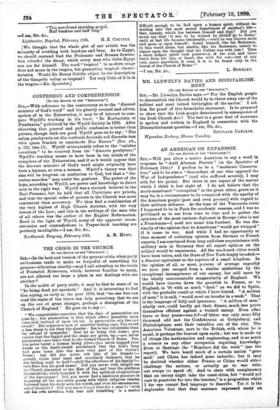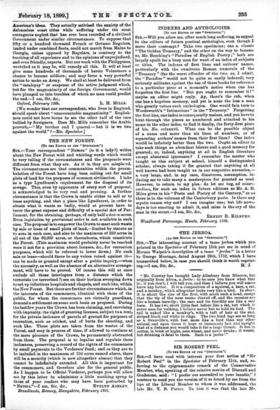AN AMERICAN ON EXPANSION.
[To THE EDITOR OF THE "SPECTATOR."]
SIR,—Will you allow a native American to say a word in response to " Audi Alteram Partem " (in the Spectator of February 11th)? I profess to be a "moderate Conserva- tive," and to be also a "descendant of one who opposed the War of Independence " (and who suffered severely, I may add, for his pains). But there is one aspect of the matter which I think is lost eight of. I do not believe that the much-mentioned "corruption" in the great cities, grave as it may be, is a circumstance to be compared with the apathy of the American people (past and even present) with regard to their military defences. At the time of the Venezuela crisis I happened to be in Paris for academic reasons, and I was so privileged as to see from time to time and to gather the opinions of the most eminent diplomat in Europe (who is not a Frenchman—I need not name him further). He was dis- tinctly of the opinion that we Americans " would get whipped" if it came to war. And while I had no opportunity at that moment of collecting opinion from German or French experts, I am convinced from long and close acquaintance with military men in Germany that all expert opinion on the subject would be unanimous. All the sea-board cities would have been taken, and the State of New York deeply invaded,— a disaster equivalent to the capture of a small kingdom. In the opinion of all, or most, persons of average oapacity we have just escaped from a similar misfortune by the exceptional incompetence of our enemy, but still more by the wholly unaccountable magnanimity of England. We would have thrown down the gauntlet to France, or to England, in '98 with as much " dash" as we did to Spain, with the probable result at which I have hinted. "A million of men," it is said, " would meet an invader in a week." That is the language of folly and ignorance. "A million of men," wholly raw, could hardly get their dinner, much less prove themselves efficient against a trained enemy. Even after three or four years—was it ?—of bitter war only some fifty thousand odd met the Confederates at Gettysburg, and Philadelphians sent their valuables out of the city. The American Volunteer, next to the British, with whom he is equal, is perhaps the bravest upon earth; but war is made up of things like mathematics and engineering, and is as much a science as any other occupation requiring knowledge. Even at Santiago the "Regulars did the work" (see the report). We have heard much of a certain nation " gone mad," and China has indeed gone imbecile; but it may be doubted whether either France or China would either challenge the nations, or actually go to war with- out troops (to speak of). And to state with complacency that an enemy might take the coast cities, but " would not care to penetrate far into the interior," is a proposition which I for one cannot find language to describe. Yet it is the deplorable fact that that sentence expressed many. an. American's ideas. They actually satirised the anxiety of the defenceless coast cities while suffering under the most outrageous negleot that has ever been recorded of a civilised Government under similar circumstances. To suppose that fifty or a hundred thousand French or German Regulars, landed under combined fleets, could not march from Maine to Georgia, unless opposed by Regulars, is contrary to the teaching of all experience and to the opinions of unprejudiced, and even friendly, experts. But our work with the Philippines, wretched as it may be, will remedy all this. It will at least give some hundreds of thousands of heroic Volunteers a chance to become soldiers ; and may force a very powerful nation to make an Army. We shall at least be delivered from the " catalepsy " or suspense of the active judgment which, but for the magnanimity of one foreign Government, would have plunged us into troubles of which no man could predict the end.—I am, Sir, &c., [We wonder that our correspondent, who lives in England, should speak about "unaccountable magnanimity." English- men could not have borne to see the other half of the race bullied by foreigners. Does Mr. Mills remember the Arabic proverb,—" My brother and I quarrel— but it is we two against the world" ?—ED. Spectator.]







































 Previous page
Previous page